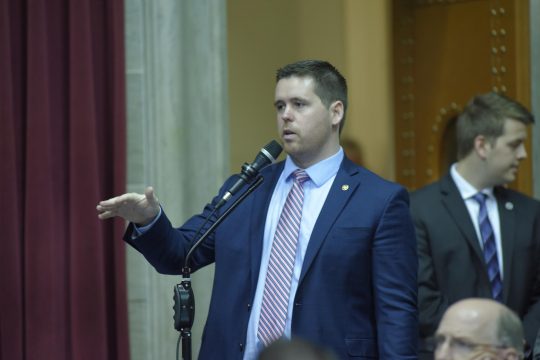JEFFERSON CITY, Mo. – The House completed their side of the budget process after roughly six hours of debate Thursday, adopting and approving conference committee substitutes, with a round of applause for Budget Chair Scott Fitzpatrick.
Fitzpatrick, coming off of his first year as budget chair, has been widely praised by both sides of the aisle, and after the dust had settled in the lower chamber, Speaker Todd Richardson had nothing but compliments for Fitzpatrick.
“I cannot be prouder of the work of Chairman Fitzpatrick and his team,” Richardson said. “This budget year was very difficult, he was also tasked with working on a shorter timeline than usual, and he did a remarkable job of leading this committee.”

That short timeline resulted from the General Assembly receiving budget recommendations from Gov. Eric Greitens weeks later than usual, putting a crunch on both Fitzpatrick and Senate Budget Chair Dan Brown to work out how to deal with the fact they would need to cut nearly half a billion dollars to make up lost revenue while continuing to pay rising Medicaid costs.
Even during the week, speculation swirled the Legislature would need to enter a special session in order to pass the budget to meet legislative timing mechanisms. Fitzpatrick and Brown rescheduled the budget conference meeting seven times earlier in the week, but Fitzpatrick said they found common ground quickly, relative to the other three years he has been apart of conference committee negotiations.
“We got to a place where we were ready to go into the conference committee and present our recommendations within 48 hours of when we started meeting, which I think is the fastest it’s ever happened since I’ve been here,” Fitzpatrick said. “We had a deadline looming, but Sen. Brown and I worked really well together.”
Among the accomplishments of the Appropriations Committee this year was the full funding for the foundation formula, an early goal of Fitzpatrick’s since he assumed the role. A group of Senators voted over Senate leadership to keep that funding, making it non-conferenceable The full funding of the formula triggers the state to pay for early childhood education next year, which Fitzpatrick believes will be less than the $62 million in the fiscal note of that bill.
Of significance to Fitzpatrick was the lack of any “E”s – or estimate – next to any line items in the budget, which means departments will not be able to take more money than what is budgeted by the legislature.
“All of the appropriations in the budget are now finite,” Fitzpatrick said. “I know that’s probably not a real sexy thing to talk about, but to me, it’s important and it’s transparent.”
However, not everyone was happy with the result of the budget. Democrats criticized the result of the budget for significant cuts to the social services.

“Unfortunately, this year we balanced the budget on the backs of our elderly and disabled,” House Minority Leader Gail McCann Beatty said.
Republicans cut roughly $50 million to the circuit breaker tax credit, which would otherwise provide relief on paying rent to elderly and disabled renters.
“We’re worried seniors are going to lose services, and in our budget right now, they will,” Rep. Michael Butler, the ranking minority member of the Appropriations Committee, said. “We have given alternatives to how senior services can be funded. Those alternatives have not been taken up in the budget and have failed in some cases.”
The House and Senate both took different positions on how to properly fund the level of care given to senior citizens and those living with disabilities. Gov. Eric Greitens’ proposed budget had cut funds, requiring those in need to be qualified as a “27 or higher.” The state currently funds at a level of care at 21. The House worked to reach that, but the Senate budget instead looked towards a compromise of 24, still requiring a greater standard of eligibility than the current standard. During the conference committee, both chambers reached a compromise which would place the level of care at 24, but with some provisions.
“We had to make some tough decisions, but we provided the Senate with the opportunity to get to the level of care that we’re at 21 points,” Fitzpatrick said.
Fitzpatrick and the House fought to get language in the bill that would allow the level of care to return to 21, but it all hinges on whether the Senate passed HCB 3, which seeks to repeal the circuit breaker tax credit. As of the publishing of this article, that bill is still up for debate on the Senate floor.
Benjamin Peters contributed to this report.








